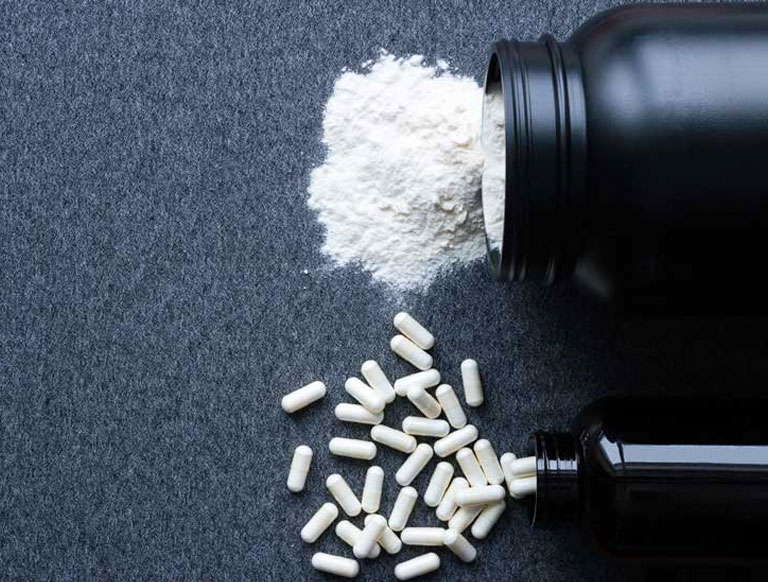Contents
If you’ve ever dabbled in the broad world of workout supplements, you’ll know there’s a lot to pick from. And, while supplementation can undoubtedly help you accomplish your nutritional, performance, and aesthetic goals (especially if you’re preparing for a bodybuilding competition), it’s not always clear which supplements are worth it and safe, and which are a waste of time.
Protein Powder
Protein powder is perhaps the most prevalent pre and post work out supplements for muscle growth these days. Sufficient protein consumption aids in the development, repair, and maintenance of muscle mass in the human body.

Numerous studies have been conducted to demonstrate the effectiveness and safety of consuming protein powders. Though there are many varieties, whey protein is the most popular since it contains the most branched-chain amino acid, especially leucine. This is significant because research suggests that leucine acts as a “light switch,” activating muscle resynthesis and so promoting recovery.
Of course, whey contains dairy, so if you’re lactose intolerant, soy, pea, egg white, rice, and hemp protein are all viable alternatives. Athletes and fitness enthusiasts should consume 1.2 to 2.0 grammes of protein per kilogramme of body weight, according to the Academy of Nutrition and Dietetics. Most people can get this much protein from diet alone, but if you’re not quite there, protein powder may be an ideal buy.
And, while it’s usually advised to consume a protein shake immediately following exercise, a new study reveals that meeting your daily protein requirements is more important. That means you can integrate post work out supplements into your daily routine at any time to meet your protein requirements and gain advantages.

Creatine Supplements
According to experts, creatine is stored in your muscles and provides them with energy. Creatine supplementation boosts the creatine deposits in your muscles, resulting in better performance during strenuous physical activity such as sprinting and strength training. Creatine is one of the most well-researched supplements available, and it is both safe and effective for increasing strength, power, and lean body mass.
Creatine can cause weight gain and muscle gain in people who use it frequently, therefore men and women who want to lose or/and maintain weight should be careful with taking too much creatine for long periods of time. However, if you’re looking to gain muscle for strength, aesthetics, or bodybuilding, this can be a beneficial supplement to your programme.
Fish Oil
There are several reasons why you might want to take fish oil (including heart health), but some athletes swear by it to reduce inflammation and consequently muscular discomfort. Fish oil is praised for its omega-3 fatty acid concentration. Omega-3 fatty acids are important fatty acids that can help to reduce inflammation at the cellular level.
Two to four grammes per day is recommended for your post-workout supplementation, and before you alter the dosage, consult with your doctor. Salmon, trout, tuna, soybeans, walnuts, and their oils are also high in omega-3 fatty acids and a delicious way to get your nutrients in.

How to Care for Your Body After Working Out
1. Take a break
You may feel lightheaded or dizzy if you stop exercising abruptly. When you exercise, your body temperature rises, and your blood vessels dilate. Your body requires time for its blood vessels to return to normal. So, use the cool-down setting on your treadmill. Alternatively, after a run, slow down and walk for a few minutes, depending on how hard you worked out.
2. Stretch out
You want your body to get back to the way it was before you started working out. Warm muscles stretch and lengthen better because they are more elastic and supple. The muscle contracts as it cools. Stretching will help you reduce discomfort, speed up your recovery, calm post-workout tension, and increase and build your range of motion.
3. Drink plenty of water
That is, with water! Your body loses water while you exercise. You want to replenish your body’s water supply to improve muscle flexibility and strength while also reducing muscle soreness. And, while it’s vital to hydrate after working out, you don’t need a sports drink which is high in calories—unless you’ve had a long and tough workout. The amount of water you need to consume varies. On average, for every pound of weight loss throughout the workout, you should drink roughly two to three cups of water.

4. Take a refreshing shower
You don’t have to take an ice bath like a professional football player. However, reduce the temperature of the shower to a lower setting than usual. After an exercise, a chilly shower helps speed up the healing process and reduce muscular inflammation. In addition, lowering inflammation reduces the likelihood of pain the following day.
5. Allow your body to heal
That implies you won’t have to plan another strenuous workout for tomorrow. Because more isn’t always better, skip the double spin classes. If you don’t give your muscles time to rest, they won’t be able to heal or repair themselves. Alter your workouts so that you use different muscles the next day, or schedule a lighter workout or a simple walk to the park.

